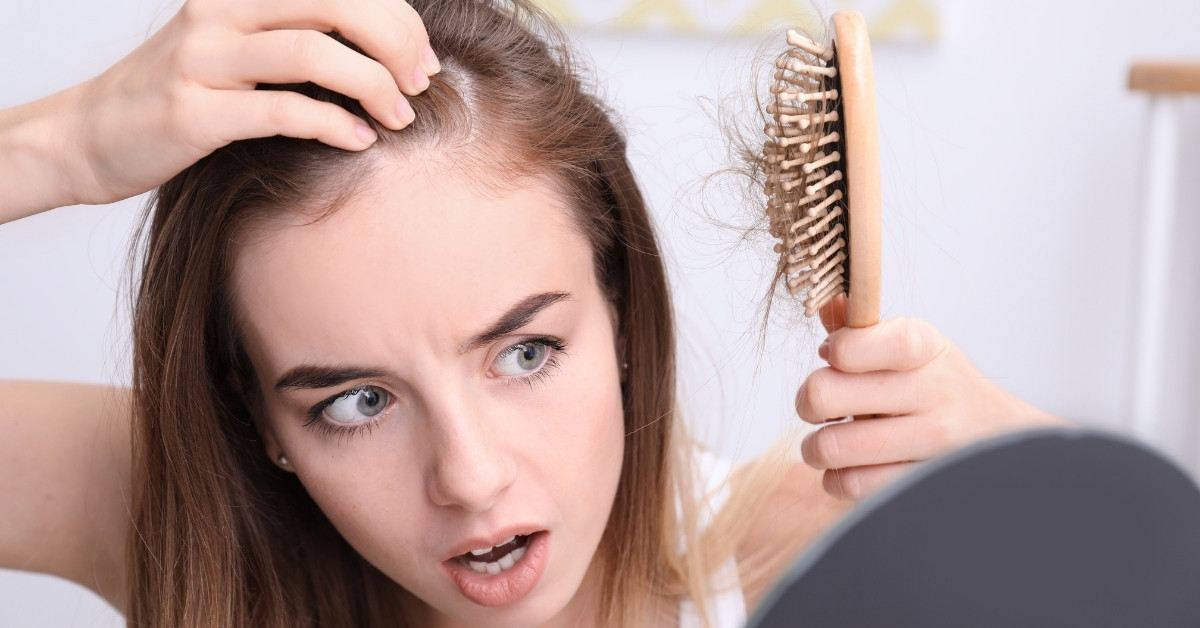In the wake of the global COVID-19 pandemic, numerous aspects of health and well-being have been brought into focus. Among these, an unexpected phenomenon has emerged: hair loss following COVID-19 infection.
This article aims to delve deeper into the intricate relationship between COVID-19 and hair loss, exploring the causes, potential treatment avenues, and the importance of seeking medical advice.
So, if your hair is falling out after COVID-19, read on to learn about the best course of action.
Exploring the Multifaceted Causes of COVID-19-Related Hair Loss
While COVID-19 has undoubtedly introduced stressors into individuals’ lives, it’s essential to recognize that hair loss is not a unique consequence of the virus. Telogen effluvium, a condition triggered by physiological stress from various sources, including illnesses and pregnancy, can lead to hair loss. This condition disrupts the normal hair growth cycle, prompting a higher rate of hair shedding during the resting phase.
However, COVID-19 has been identified as a potential trigger for telogen effluvium, adding to the list of stressors that can induce this type of hair loss.
The timeline for this form of hair loss typically occurs around 3-4 months after a period of significant stress, and it can last for 3-6 months. Fortunately, in many cases, this condition tends to resolve on its own without requiring specific treatment.
The Role of Hormonal Imbalance in Hair Loss after COVID-19
In addition to telogen effluvium, COVID-19-related hair loss can also be attributed to hormonal imbalances brought about by the virus. Given the profound emotional and physiological stress that COVID-19 can impose on the body, hormonal treatments have emerged as a potential solution for individuals facing this issue.
Post-COVID Thyroiditis: A Culprit Behind Hair Loss
One specific condition that can lead to hair loss after a COVID-19 infection is post-COVID thyroiditis.
This condition arises due to the lingering impact of the virus on various bodily systems. COVID-19’s inflammatory effects can extend to the thyroid gland, causing it to become overactive. The ensuing excess production of thyroid hormones can contribute to hair loss.
Recognizing Symptoms of Post-COVID Thyroiditis
Identifying post-COVID thyroiditis involves understanding its symptoms, which may include:
- Night sweats
- Hot flashes
- Heart palpitations
- Excessive sweating
- Unexplained weight loss
- Heightened activity levels
- Sleep disturbances
- Thyroid pain or discomfort in the neck area
To effectively address post-COVID thyroiditis, hormone-based treatments, under the guidance of medical professionals, are typically recommended.
Hormone Treatments for COVID-19-Related Hair Loss
Harnessing the potential of hormone treatments presents a promising strategy for combating hair loss triggered by COVID-19. Two primary treatments, minoxidil, and finasteride, offer avenues for individuals seeking to mitigate this issue.
Minoxidil
Minoxidil, well-known for its role in hair growth treatments like Rogaine, stands as a viable option for addressing COVID-19-related hair loss. Available in foam or liquid forms, this treatment is applied directly to the scalp according to medical guidance. Although widely recognized for treating male and female pattern baldness, minoxidil’s efficacy is maximized when initiated at the first signs of hair loss.
Finasteride
Another potent treatment option, finasteride, commonly referred to as Propecia, is often used to counteract alopecia and male pattern baldness. This hormone treatment not only halts the progression of hair loss but also fosters the growth of new hair. It operates by inhibiting the conversion of testosterone into dihydrotestosterone (DHT), a hormone notorious for damaging hair follicles in men. A doctor’s prescription is a prerequisite for accessing this treatment.
Partnering with Medical Professionals
If COVID-19-related hair loss is a concern, seeking the guidance of a medical professional is crucial. Requesting a thyroid panel can provide insights into the presence of post-COVID thyroiditis, while hormone testing can reveal potential imbalances contributing to hair loss. Armed with accurate information, tailored treatment strategies can be formulated to arrest the progression of the issue and potentially stimulate hair regrowth.
Conclusion: Navigating Recovery from COVID-19-Related Hair Loss
The link between COVID-19 and hair loss is an area of growing interest and research. While telogen effluvium remains a potential outcome of the physiological stress induced by the virus, post-COVID thyroiditis offers another avenue for hair loss. Both conditions can be addressed and managed through a combination of patient resilience and targeted hormone treatments.
Are you prepared to tackle your hair loss concerns head-on and embark on a journey to restore your hair’s vibrancy? Reach out to EVOLVE patient care today to take the first step toward reclaiming your confidence and healthy hair. Our expert team is here to support you throughout your journey to recovery.







